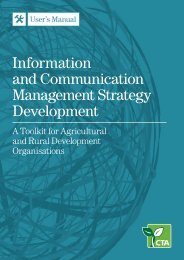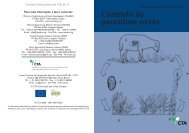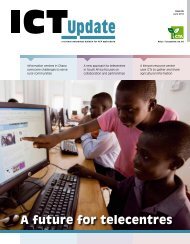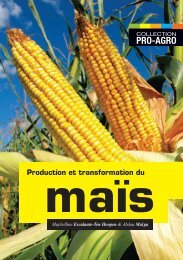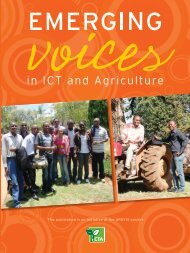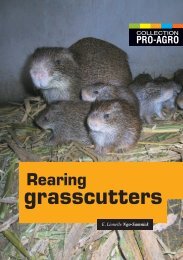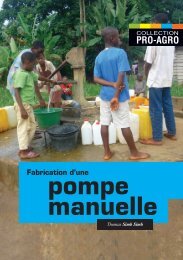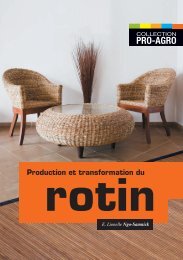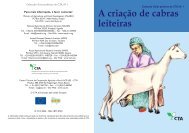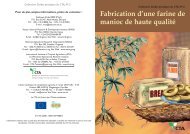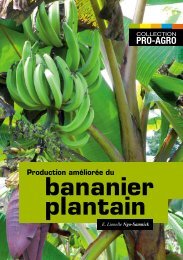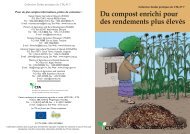Strategy 2.6 Protect <strong>Africa</strong>n genetic resources – pastoral animals and plantsIt is widely recognized that ‘genetic improvement’ of <strong>Africa</strong>n pastoral livestock by replac<strong>in</strong>glocal breeds or crossbreed<strong>in</strong>g with exotic breeds imported from Europe, achieved very limitedimpact. These technical approaches overlooked the long evolution and adaptability of <strong>Africa</strong>nbreeds, and <strong>in</strong> pastoral areas, the careful selective breed<strong>in</strong>g practices of pastoralists whichemphasized comb<strong>in</strong>ations of traits such as high drought resistance and milk production.The livestock and plant genetic resources <strong>in</strong> pastoral areas of <strong>Africa</strong> are a considerable resource<strong>for</strong> the cont<strong>in</strong>ent which warrant protection through national and regional policies. In someareas, dryland plants have not been fully recorded or identified and there<strong>for</strong>e, there is need tosupport comprehensive <strong>in</strong>ventories of plants <strong>in</strong> pastoral areas, <strong>in</strong>clud<strong>in</strong>g those of potentialeconomic importance.Strategy 2.7 Research and extensionLong-term susta<strong>in</strong>able pastoral development requires a good knowledge of the dynamics of multiplefactors underl<strong>in</strong><strong>in</strong>g pastoralism and here, research has a crucial role to play. Alongside support toimproved primary and secondary education, is the need to strengthen <strong>in</strong>stitutions of higher learn<strong>in</strong>gand research <strong>in</strong> pastoral areas of <strong>Africa</strong>. Such <strong>in</strong>stitutions require support to conduct research ona range of political, social and natural science subjects, and at levels which range from local adaptationthrough to regional <strong>in</strong>tegration and global trends. The l<strong>in</strong>ks between research and policyalso need to be strengthened, so that policy responds to the dynamics of pastoral livelihoods and<strong>in</strong> the face of global factors.Among the research programmes which are relevant across pastoral areas of <strong>Africa</strong> is the quantitativeassessment and monitor<strong>in</strong>g of rangeland resources, with analysis of the factors caus<strong>in</strong>g rangelanddegradation and reduced access to rangelands <strong>for</strong> pastoralists. Similarly, further economicanalyses of pastoral production are required, with comparative studies on different land use options.A second general area of research is regional TAD control, draw<strong>in</strong>g on analysis of epidemiological,economic and market factors, comb<strong>in</strong>ed with assessment of the technical and economic feasibilityof different control options. Both these research topics can benefit from the extensive <strong>in</strong>digenousknowledge of pastoralists.In the area of natural science research there is also a need to conduct research which respondsto the problems and <strong>in</strong>terests of pastoralists. Specific research areas should be identified locally,<strong>in</strong> a participatory manner with pastoralists, and so will vary by location. Possible researchprogrammes <strong>in</strong>clude:i. Drought resistant <strong>for</strong>age species;ii. Conservation and improvement of the animal and plant genetic resource base;iii. Control of <strong>in</strong>vad<strong>in</strong>g weeds and bush encroachment;iv. Camel husbandry and diseases.Secur<strong>in</strong>g, Protect<strong>in</strong>g and Improv<strong>in</strong>g the Lives, Livelihoods and Rights of Pastoralist Communities41
5. Apply<strong>in</strong>g the <strong>Policy</strong> FrameworkIt is important to reiterate that the underly<strong>in</strong>g objectives of the pastoral policy <strong>in</strong>itiative is to develop<strong>framework</strong> that could be used <strong>in</strong> the process of pastoral policy development, pastoral policy implementation;and monitor<strong>in</strong>g and evaluation of progress made <strong>in</strong> these processes. The follow<strong>in</strong>gsections outl<strong>in</strong>e the essential elements of these processes.5.1 Initiation of Pastoral <strong>Policy</strong> Development ProcessIt is advisable that the pastoral policy development is <strong>in</strong>itiated at a country level with the establishmentof a national steer<strong>in</strong>g committee and a strong national <strong>in</strong>ter-discipl<strong>in</strong>ary support teamof experts. The national steer<strong>in</strong>g committee will be charged with the mission to provide guidanceand supervision at each stage of the national pastoral policy development process. It may compriseof members represent<strong>in</strong>g key sector <strong>in</strong>stitutions, such as m<strong>in</strong>istry <strong>in</strong> charge of agriculture,livestock, environment, water, territorial adm<strong>in</strong>istration, local development, health, education,agricultural research, pastoralist organisations/associations/councils, civil society organizations,and development partners.The national support team of experts may be composed of experts from livestock, justice, land,f<strong>in</strong>ance/economy, universities/research systems, etc., who have experiences <strong>in</strong> local pastoral issues.The team’s ma<strong>in</strong> preoccupation will be develop<strong>in</strong>g the national pastoral policy and strategies, andfollow<strong>in</strong>g up its implementation after its adoption. Plann<strong>in</strong>g the development of the national pastoralpolicy implies: (i) def<strong>in</strong><strong>in</strong>g national pastoral policy development objectives, results requiredto meet these objectives and related operational plans, <strong>in</strong>stitutional sett<strong>in</strong>gs and monitor<strong>in</strong>g andevaluation mechanism <strong>for</strong> the policy development process with clearly def<strong>in</strong>ed <strong>in</strong>dicators andreport<strong>in</strong>g schedule; (ii) establish<strong>in</strong>g policy development timeframe follow<strong>in</strong>g a phased out anditerative model with clear milestones to which key stakeholders will subscribe; (iii) clarify<strong>in</strong>g roles;and (iv) determ<strong>in</strong><strong>in</strong>g human and f<strong>in</strong>ancial resource requirements. Subsequent to plann<strong>in</strong>g, the ma<strong>in</strong>task of the national support team of experts will comprise (i) identification of key pastoral issuesat country level through literature review and local assessments and public consultation meet<strong>in</strong>gswith relevant stakeholders; (ii) draft<strong>in</strong>g of the national pastoral policy; and (iii) presentation of thedraft pastoral policy at local and national consultation meet<strong>in</strong>gs <strong>for</strong> validation be<strong>for</strong>e its adoptionby relevant authorities.5.2 Key steps <strong>in</strong> pastoral policy developmentIt is important to emphasize that pastoral policy development is a complex exercise. It should beparticipatory and <strong>in</strong>volve the follow<strong>in</strong>g fundamental <strong>in</strong>teractive steps to be per<strong>for</strong>med:--stakeholder consultation and identification of salient problems <strong>in</strong> the pastoral sector;--preparation of work<strong>in</strong>g documents <strong>for</strong> further discussion with stakeholders;--appraisal of <strong>in</strong>stitutional and f<strong>in</strong>ancial/budgetary options;--ref<strong>in</strong>ement, process<strong>in</strong>g and approval of the national pastoral policy;--design of implementation programs and rationalization of <strong>in</strong>stitutional responsibilities <strong>for</strong>implementation;42 <strong>Policy</strong> <strong>framework</strong> <strong>for</strong> <strong>Pastoralism</strong> <strong>in</strong> <strong>Africa</strong>




